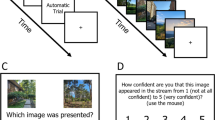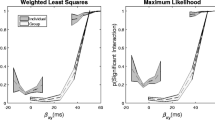Abstract
In the present research, we produce a coherent account of the storage and retrieval processes in short- and long-term event memory, and long-term knowledge, that produce response accuracy and response time in a wide variety of conditions in our studies of recognition memory. Two to nine pictures are studied sequentially followed by a target or foil test picture in four conditions used in Nosofsky et al. Journal of Experimental Psychology: Learning, Memory, and Cognition, 47, 316–342, (2021) and in our new paradigm: VM: target and foil responses to a given stimulus change from trial to trial; CM: the responses do not change from trial to trial; AN: every trial uses new stimuli; MIXED: combinations of VM, CN, and AN occur on each trial. In the new paradigm a given picture is equally often tested as old or new, but only in CM is the response key the same and learnable. Our model has components that have appeared in a variety of prior accounts, including learning and familiarity, but are given support by our demonstration that accuracy and response time data from a large variety of conditions can be predicted by these processes acting together, with parameter values that largely are unchanged. A longer version of this article, containing information not found here due to space, is available online https://doi.org/10.31234/osf.io/h8msp.
The avalibility of the data (supplement materials), info and link is attached at the end section (https://psyarxiv.com/h8msp.).





Similar content being viewed by others
Data Availability
Data can be downloaded from the Open Science Framework (OSF) at https://osf.io/jp7b3/.
Code Availability
The Julia program scripts used for modeling and the Matlab program scripts for creating experiments are available for download on OSF at https://osf.io/jp7b3/.
Notes
In response to requests from a reviewer and editor, the present data were analyzed using the 2021 criteria, but median RTs became very irregular and noisy. The present data were then analyzed with criteria of 180 and 2,000; this dropped the excluded data from about 16% to 6%; this shift changed accuracy imperceptibly and caused median RT to become slightly more noisy but without changing any of the trends. The original chosen criteria are used for the present data because they were chosen in advance and hence are unbiased.
An Appendix in the archived report gives the values and number of observations for every condition, and for correct response times of the average of the medians, and their standard deviation, across the participants. That appendix also gives the model predictions for each point.
References
Atkinson, R. C., & Juola, J. F. (1974). Search and decision processes in recognition memory. In D. H. Krantz, R. C. Atkinson, R. D. Luce, & P. Suppes (Eds.), Contemporary developments in mathematical psychology: I. Learning, memory and thinking. W. H. Freeman.
Atkinson, R. C., & Shiffrin, R. M. (1968). Human memory: A proposed system and its control processes. In K. W. Spence & J. T. Spence (Eds.), The psychology of learning and motivation: II. Academic Press. https://doi.org/10.1016/S0079-7421(08)60422-3
Bezanson, J., Edelman, A., Karpinski, S., & Shah, V. B. (2017). Julia: A fresh approach to numerical computing. SIAM Review, 59(1), 65–98. https://doi.org/10.1137/141000671
Brady, T. F., Konkle, T., Alvarez, G. A., & Oliva, A. (2008). Visual long-term memory has a massive storage capacity for object details. Proceedings of the National Academy of Sciences of the United States of America, 105(38), 14325–14329. https://doi.org/10.1073/pnas.0803390105
Brainard, D. H. (1997). The Psychophysics Toolbox. Spatial Vision, 10(4), 433–436.
Busemeyer, J. R. (1982). Choice behavior in a sequential decision-making task. Organizational Behavior & Human Performance, 29(2), 175–207. https://doi.org/10.1016/0030-5073(82)90255-0
Cao, R., Nosofsky, R. M., & Shiffrin, R. M. (2017). The development of automaticity in short-term memory search: Item-response learning and category learning. Journal of Experimental Psychology: Learning, Memory, and Cognition, 43(5), 669–679. https://doi.org/10.1037/xlm0000355
Cao, R., Shiffrin, R. M., & Nosofsky, R. M. (2018). Item frequency in probe-recognition memory search: Converging evidence for a role of item-response learning. Memory & Cognition, 46(3), 450–463. https://doi.org/10.3758/s13421-017-0777-1
Clark, T. K., & Merfeld, D. M. (2021). Statistical approaches to identifying lapses in psychometric response data. Psychonomic Bulletin & Review, 28(5), 1433–1457. https://doi.org/10.3758/s13423-021-01876-2
Cox, G. E., & Shiffrin, R. M. (2017). A dynamic approach to recognition memory. Psychological Review, 124(6), 795–860. https://doi.org/10.1037/rev0000076
Cox, G., & Shiffrin, R. M. (in press). Computational models of event memory. In M. J. Kahana & A. D. Wagner (Eds.), Handbook on human memory. Oxford University Press.
Criss, A. H., & Shiffrin, R. M. (2004). Context noise and item noise jointly determine recognition memory: A comment on Dennis and Humphreys (2001). Psychological Review, 111(3), 800–807. https://doi.org/10.1037/0033-295X.111.3.800
Criss, A. H., Malmberg, K. J., & Shiffrin, R. M. (2011). Output interference in recognition memory testing. Journal of Memory and Language, 64(4), 316–326.
Donkin, C., & Nosofsky, R. M. (2012). The structure of short-term memory scanning: An investigation using response time distribution models. Psychonomic Bulletin & Review, 19(3), 363–394. https://doi.org/10.3758/s13423-012-0236-8
Donkin, C., & Nosofsky, R. M. (2012). A power-law model of psychological memory strength in short- and long-term recognition. Psychological science, 23(6), 625–634. https://doi.org/10.1177/0956797611430961
Dunn, J. C. (2008). The dimensionality of the remember-know task: A state-trace analysis. Psychological Review, 115(2), 426–446.
Dunning, I., Huchette, J., & Lubin, M. (2017). JuMP: A modeling language for mathematical optimization. SIAM Review, 59(2), 295–320. https://doi.org/10.1137/15M1020575
Gardiner, J. M., & Java, R. I. (1990). Recollective experience in word and nonword recognition. Memory & Cognition, 18(1), 23–30. https://doi.org/10.3758/BF03202642
Gillund, G., & Shiffrin, R. M. (1984). A retrieval model for both recognition and recall. Psychological Review, 91(1), 1–67. https://doi.org/10.1037/0033-295X.91.1.1
Harding, S. M., Cousineau, D., & Shiffrin, R. M. (2021). Dynamic perception of well-learned perceptual objects. Computational Brain & Behavior, 4(4), 497–518.
Holmes, W. R., Trueblood, J. S., & Heathcote, A. (2016). A new framework for modeling decisions about changing information: The piecewise linear ballistic accumulator model. Cognitive Psychology, 85, 1–29. https://doi.org/10.1016/j.cogpsych.2015.11.002
Howard, M. W., & Kahana, M. J. (2002). A distributed representation of temporal context. Journal of Mathematical Psychology, 46(3), 269–299.
Laming, D. R. J. (1968). Information theory of choice-reaction times. Academic Press.
Lin, H-Y., & Oberauer, K. (2022). An interference model for visual working memory: Applications to the change detection task. Cognitive Psychology, 133, https://doi.org/10.1016/j.cogpsych.2022.101463
Link, S. W., & Heath, R. A. (1975). A sequential theory of psychological discrimination. Psychometrika, 40(1), 77–105. https://doi.org/10.1007/BF02291481
Malmberg, K. J. (2008). Recognition memory: A review of the critical findings and an integrated theory for relating them. Cognitive Psychology, 57(4), 335–384. https://doi.org/10.1016/j.cogpsych.2008.02.004
Mandler, G., Pearlstone, Z., & Koopmans, H. S. (1969). Effects of organization and semantic similarity on recall and recognition. Journal of Verbal Learning & Verbal Behavior, 8(3), 410–423.
McElree, B., & Dosher, B. A. (1989). Serial position and set size in short-term memory: Time course of recognition. Journal of Experimental Psychology: General, 118(4), 346–373. https://doi.org/10.1037/0096-3445.118.4.346
Monsell, S. (1978). Recency, immediate recognition memory, and reaction time. Cognitive Psychology, 10(4), 465–501. https://doi.org/10.1016/0010-0285(78)90008-7
Nelson, A. B., & Shiffrin, R. M. (2013). The co-evolution of knowledge and event memory. Psychological Review, 120(2), 356–394.
Nosofsky, R. M. (1986). Attention, similarity, and the identification-categorization relationship. Journal of Experimental Psychology: General, 115(1), 39–57.
Nosofsky, R. M. (2011). The generalized context model: An exemplar model of classification. In E. M. Pothos & A. J. Wills (Eds.), Formal approaches in categorization (pp. 18–39). Cambridge University Press.
Nosofsky, R. M. (2016). An exemplar-retrieval model of short-term memory search: Linking categorization and probe recognition. In B. H. Ross (Ed.), The psychology of learning and motivation (pp. 47–84). Elsevier Academic Press.
Nosofsky, R. M., Cao, R., Cox, G. E., & Shiffrin, R. M. (2014). Familiarity and categorization processes in memory search. Cognitive Psychology, 75, 97–129. https://doi.org/10.1016/j.cogpsych.2014.08.003
Nosofsky, R. M., Cox, G. E., Cao, R., & Shiffrin, R. M. (2014). An exemplar-familiarity model predicts short-term and long-term probe recognition across diverse forms of memory search. Journal of Experimental Psychology: Learning, Memory, and Cognition, 40(6), 1524–1539. https://doi.org/10.1037/xlm0000015
Nosofsky, R. M., Cao, R., Harding, S., & Shiffrin, R. M. (2021). Modeling short- and long-term memory contributions to recent event recognition. Journal of Experimental Psychology: Learning, Memory, and Cognition, 47(2), 316–342.
Nosofsky, R. M., & Donkin, C. (2016). Response-time evidence for mixed memory states in a sequential-presentation change-detection task. Cognitive Psychology, 84, 31–62.
Nosofsky, R. M., Little, D. R., Donkin, C., & Fific, M. (2011). Short-term memory scanning viewed as exemplar-based categorization. Psychological Review, 118(2), 280–315.
Nosofsky, R. M., & Palmeri, T. J. (1997). An exemplar-based random walk model of speeded classification. Psychological Review, 104(2), 266–300.
Oberauer, K., Farrell, S., Jarrold, C., & Lewandowsky, S. (2016). What limits working memory capacity? Psychological Bulletin, 142(7), 758–799.
Raaijmakers, J. G. W., & Shiffrin, R. M. (1980). SAM: A theory of probabilistic search of associative memory. In G. H. Bower (Ed.), The psychology of learning and motivation (14th ed., pp. 207–262). Academic Press.
Raaijmakers, J. G., & Shiffrin, R. M. (1981). Search of associative memory. Psychological Review, 88(2), 93–134. https://doi.org/10.1037/0033-295X.88.2.93
Ratcliff, R. (1978). A theory of memory retrieval. Psychological Review, 85(2), 59–108. https://doi.org/10.1037/0033-295X.85.2.59
Ratcliff, R., & Kang, I. (2021). Qualitative speed-accuracy tradeoff effects can be explained by a diffusion/fast guess mixture model. Scientific Reports, 11(1), 15169.
Roediger, H. L., III., & Karpicke, J. D. (2006). Test-enhanced learning: Taking memory tests improves long-term retention. Psychological science, 17(3), 249–255.
Schneider, W., & Shiffrin, R. M. (1977). Controlled and automatic human information processing: I. Detection, search, and attention. Psychological Review, 84(1), 1–66. https://doi.org/10.1037/0033-295X.84.1.1
Shiffrin, R. M., & Schneider, W. (1977). Controlled and automatic human information processing: II Perceptual learning, automatic attending and a general theory. Psychological Review, 84(2), 127–190. https://doi.org/10.1037/0033-295X.84.2.127
Shiffrin, R. M., & Steyvers, M. (1997). A model for recognition memory: REM: Retrieving effectively from memory. Psychonomic Bulletin & Review, 4(2), 145–166.
Shiffrin, R. M., & Steyvers, M. (1998). The effectiveness of retrieval from memory. In M. Oaksford & N. Chater (Eds.), Rational models of cognition (pp. 73–95). Oxford University Press.
Smith, E. E. (1978). Theories of semantic memory. In W. K. Estes (Ed.), Handbook of learning and cognitive processes: Linguistic functions in cognitive theory (6th ed., pp. 1–56). Erlbaum.
Sternberg, S. (1966). High-speed scanning in human memory. Science, 153(3736), 652–654. https://doi.org/10.1126/science.153.3736.652
Vickers, D. (1979). Decision processes in visual perception. Academic Press.
Author information
Authors and Affiliations
Corresponding author
Additional information
Publisher's Note
Springer Nature remains neutral with regard to jurisdictional claims in published maps and institutional affiliations.
Rights and permissions
Springer Nature or its licensor (e.g. a society or other partner) holds exclusive rights to this article under a publishing agreement with the author(s) or other rightsholder(s); author self-archiving of the accepted manuscript version of this article is solely governed by the terms of such publishing agreement and applicable law.
About this article
Cite this article
Lai, S.L., Cao, R. & Shiffrin, R.M. Recognition memory decisions made with short- and long-term retrieval. Mem Cogn (2024). https://doi.org/10.3758/s13421-024-01518-7
Accepted:
Published:
DOI: https://doi.org/10.3758/s13421-024-01518-7




